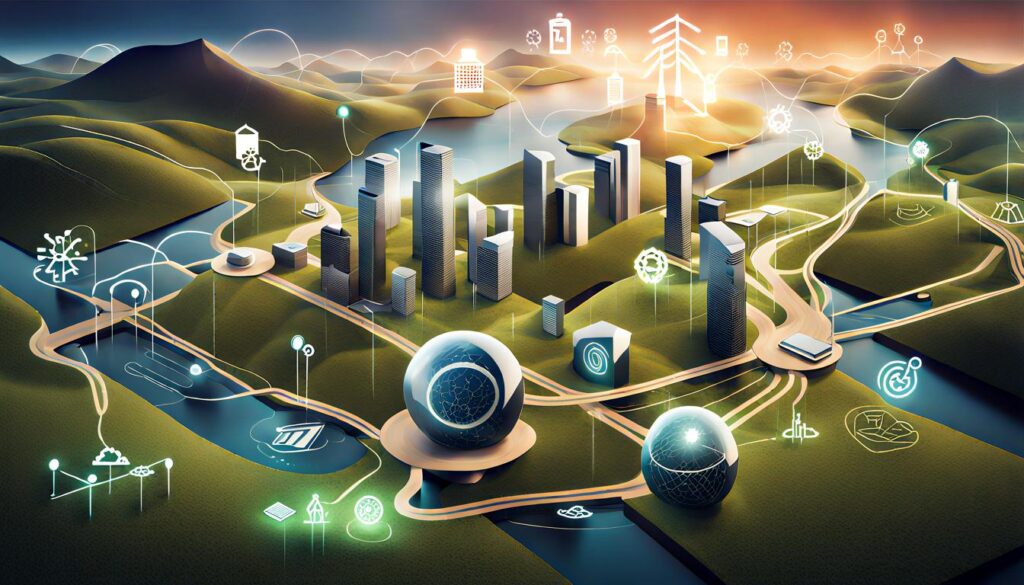
In our journey through the world of business ecosystems, we've explored their intricacies, from their foundational concepts to the practical applications across various industries. In Part 8 we discussed the risks and challenges in business ecosystems. As we approach the penultimate part of our primer series, it's time to cast our gaze forward and contemplate the future of business ecosystems. What lies ahead for this dynamic and evolving model of commerce?
The Future: The Evolution Continues
Business ecosystems, like living organisms, are in a constant state of evolution. They adapt to changing market dynamics, technological advancements, and shifting customer preferences. The future promises even more profound transformations. Let's delve into some key aspects that will shape the future of business ecosystems.
1. Sustainability Takes Centre Stage
As the world grapples with pressing environmental concerns, sustainability will become an integral part of business ecosystems. Companies will need to consider the environmental impact of their operations and products. Collaborative efforts within ecosystems can drive innovation in sustainable practices, making them not just a necessity but a competitive advantage.
2. AI and Automation Redefine Roles
Artificial intelligence (AI) and automation are poised to revolutionize the way ecosystems function. With AI-driven analytics and decision-making, businesses can optimize their operations and respond more effectively to customer needs. Automation can streamline processes, reducing costs and improving efficiency across ecosystem participants.
3. Data Becomes the New Currency
In the future, data will be more than just an asset; it will be the lifeblood of business ecosystems. The ability to harness and analyse data will be a defining factor in a company's success. Ecosystem participants will collaborate to collect, share, and leverage data to gain insights, personalize offerings, and enhance customer experiences.
4. Ecosystems Across Industries Converge
We've seen how ecosystems operate within specific industries, but the lines between these sectors will blur in the future. Cross-industry collaborations will become more common, as businesses realize the potential for innovation and growth by tapping into diverse ecosystems. This convergence will lead to novel solutions and business models.
5. New Players and Disruptions Emerge
In the fast-paced world of business ecosystems, new entrants can quickly disrupt established players. Start-ups and tech giants alike will continue to disrupt traditional industries, forcing ecosystem participants to adapt or risk obsolescence. Being open to innovation and nimble in response will be critical.
6. Regulatory Landscape Evolves
As business ecosystems expand in influence, regulators will step in to ensure fair competition and protect consumers. Understanding and navigating the evolving regulatory landscape will be a skill that businesses must master to thrive in the future.
7. Globalization and Geopolitical Factors
Globalization has already connected businesses around the world, and geopolitical factors can influence how ecosystems operate. Tariffs, trade agreements, and political tensions can impact the flow of goods, services, and data within ecosystems. Businesses will need to monitor and adapt to these factors.
8. Changing Customer Expectations
Customer expectations are constantly evolving, driven by technology and changing lifestyles. Businesses within ecosystems must stay attuned to these shifts and collaborate to deliver products and services that meet these new demands.
9. Resilience and Risk Management
In an interconnected ecosystem, risks can propagate quickly. Future ecosystems will prioritize resilience and risk management, with participants working together to identify, assess, and mitigate potential threats.
10. The Human Element
Amidst all the technological advancements, the human element remains crucial. Building trust and relationships among ecosystem participants will continue to be a cornerstone of success. The ability to communicate, collaborate, and adapt within the ecosystem will remain essential skills.
The Future: Conclusion
The future of business ecosystems holds both challenges and opportunities. To thrive in this evolving landscape, companies must be agile, data-savvy, sustainable, and adaptable. They must embrace innovation and collaboration, while also staying attuned to regulatory and geopolitical shifts. The future belongs to those who can navigate these complexities and harness the full potential of business ecosystems.
As we look ahead to what tomorrow may bring, it's essential to remember that the journey is far from over. Business ecosystems will continue to evolve, and so must our understanding of them. Join us in our next and final instalment, where we explore "Building and Nurturing Your Own Ecosystem" – a practical toolkit for those ready to embark on their ecosystem-building journey.
For an in-depth exploration of the subject of business ecosystems, please see the two books listed below.
Business Climate Change on Amazon Kindle
Business Ecosystems Handbook on Amazon Kindle
Both these books are available as Kindle Editions on Amazon. The Kindle app is free and available on most devices including laptops, tablets and phones. These links are to the US site, but the books are available from your local site too.

